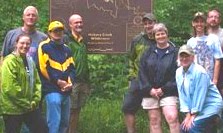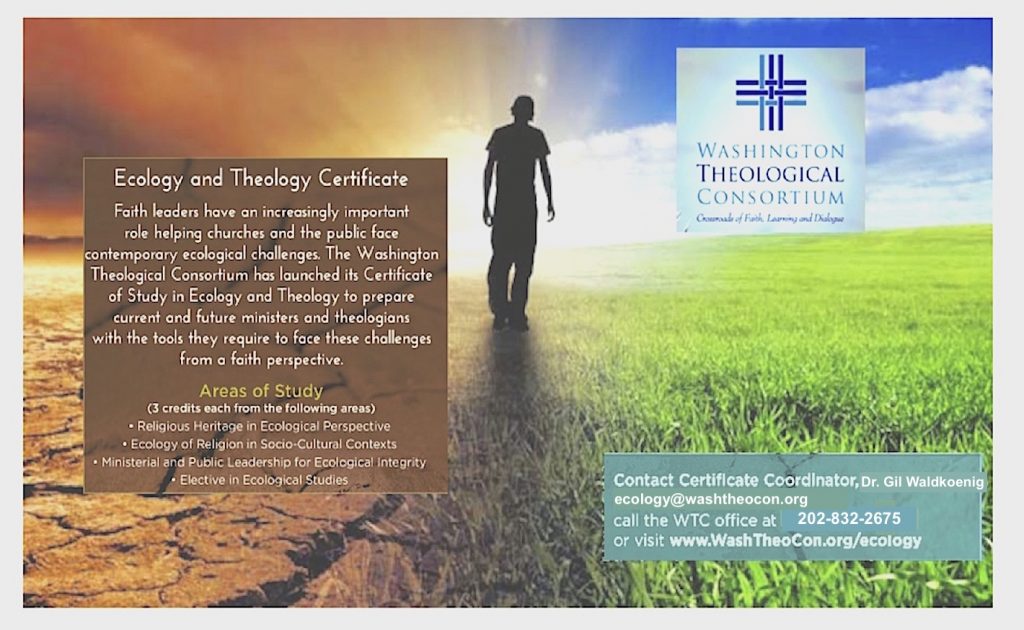The Consortium has a new Certificate of study in Ecology and Theology, in response to growing church commitments to address the ecological crisis, Pope Francis’ encyclical Laudato Si’ and the work of the “Green Patriarch” Bartholomew, among others.
Colleges and universities have been developing programs in ecology and integrating ecological studies across their curricula. Church organizations and congregations have been devoting increasing attention to theology and ministry pertaining to environmental sustainability and the integrity of creation. Theological schools and other faith-based groups are increasingly recognizing the importance of the role of religious leaders in helping the public to face ecological challenges from a faith perspective. At the Washington Theological Consortium, a group of faculty who teach at the intersection of theology and ecology have designed a certificate to encourage our students and members of the public to explore further their own interest in the study of theology and ecology.
PURPOSE
The Purposes of this Certificate are (a) to give students a deeper knowledge of theology and ecology; (b) to enable students to assume positions of environmental leadership in church and society; and (c) to provide a foundation for the future study of theology and ecology. It involves 12 semester credits (or equivalent) in ways that address: religious heritage in ecological perspective, ecology and religion in cultural context, and capacity for ministerial and public leadership for ecological integrity.
STRUCTURE
To receive the Certificate in Theology and Ecology, the student must complete a total of twelve semester credits or equivalent in courses related to theology and ecology that are offered in the Consortium member schools.
Required Areas of Study. Students should earn 3 credits from each of the following areas. The Certificate Coordinator will pre-list courses available in each area (on WTC website), and approve any electives the student proposes. With Coordinator approval, a student may take 2 credits in one area while making up for overall credits in other areas.
- Religious Heritage in Ecological Perspective (courses such as: Ecological Hermeneutics and Scripture, History of Religious Thought and the Natural Environment, Theology and the Natural World, Theological Anthropology in an Ecological Perspective, Development of Ecological Ethics in Religious Thought, Interfaith approaches to Ecological issues);
- Ecology and Religion in Socio-Cultural Context (courses such as: Ecology and Religion in the Arts, Social Scientific Perspectives on Religion and Ecology, Religion and Nature in the Natural Sciences, Cultural Immersion and Experiential courses with an Environmental Focus);
- Capacity for Ministerial and Public Leadership for Ecological Integrity (any courses that address ecological issues in leadership, ministerial practices (worship, preaching, etc.), spiritual life, religious education, political community, ecclesial community and practicum in supervised ministry that have a strong focus on environmental issues).
- An Elective related to Ecological Studies (listed WTC course, reading course, field education project, etc.)
For more information, contact Certificate Coordinator, Dr. Gil Waldkoenig by e-mail or call the WTC office: 202-832-2675 .
Quick Ecology and Theology Cert FAQ general
Approved by the WTC Council of Deans, April 17, 2015
Download and share the Ecology Certificate Postcard as a high resolution PDF or as a high resolution digital graphic. (Note: Large files.) There is also a low resolution PDF available.
Visit the new Consortium Resource on Ecology and the Churches


